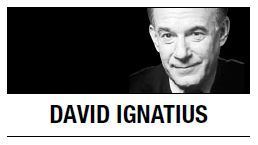[David Ignatius] Let Mueller unravel Russian meddling
By David IgnatiusPublished : Nov. 2, 2017 - 17:30
 Has there ever been a covert action that backfired as disastrously as Russia’s attempt to meddle in the 2016 US presidential campaign?
Has there ever been a covert action that backfired as disastrously as Russia’s attempt to meddle in the 2016 US presidential campaign?Granted, we know all the reasons Moscow is gloating: Donald Trump is president; America is divided and confused; Russia’s propagandization of “fake news” is now repeated by people around the world as evidence that nothing is believable and all information is (as in Russia) manipulated and mendacious.
But against this cynical strategy there now stands a process embodied by special counsel Robert Mueller, which we will call, as a shorthand: “The Truth.” Mueller has mobilized the investigative powers of the US government to document how Russia and its friends sought to manipulate American politics. We are seeing the rule of law, applied.
Put aside for the moment what the indictments and plea agreement announced Monday will ultimately mean for Trump’s presidency. Already, Mueller has stripped the cover from Russia’s machinations: Trump former foreign policy adviser George Papadopoulos has confessed that he lied to FBI agents about his contacts with individuals connected to Moscow who promised “dirt” on Hillary Clinton; Trump’s former campaign chairman Paul Manafort has been charged with laundering $18 million in payoffs from Russia’s Ukrainian friends.
Russian meddling is now advertised to the world. This topic will dominate American debate for the next year, at least. In Europe, meanwhile, a similar reaction to Russian influence operations is gaining force. President Vladimir Putin once imagined that Trump would be Russia’s bridge back from isolation. Not anymore.
Next comes the overtly dangerous part: When covert operations are exposed, nations sometimes adopt more aggressive actions. On the continuum of warfare, Russia has been playing somewhere in the middle, between war and peace. Now, as the world focuses on Russian mischief, will the Kremlin move the dial up or down?
Putin made some comments last week that worry me. Before a meeting of his security council on Oct. 26, Putin announced that he was augmenting cyberwar policies to take into account “that the level of threat in the information space is on the rise.”
He proposed “additional measures” to combat adversaries and protect Russia. He argued that Russia was simply protecting its citizens from cybercriminals, but his language was emphatic: “It is necessary to be tough as regards those persons and groups that are using the Internet and the information space for criminal purposes.”
To me, that sounded like Putin was doubling down on Russia’s bid to shape the “information space,” by whatever means necessary. That was reinforced by his call for “a system of international information security,” in which Russia would seek to impose new rules for the internet through the United Nations and other pliable international organizations. That’s a threat I noted a week ago, now confirmed explicitly by Putin.
The potential scope of Russia’s cyberoperations was highlighted in a little-noticed report by the Defense Intelligence Agency, “Russia Military Power: Building a Military to Support Great Power Aspirations.” Its conclusion: “Russia views the information sphere as a key domain for modern military conflict ... critically important to control its domestic populace and influence adversary states.”
The DIA explains how “Russian propaganda strives to influence, confuse and demoralize its intended audience.” The report describes Russian trolls, bots and cover organizations. Among the major themes of Russian propaganda, the DIA says, is this Steve Bannon-esque message: “The West’s liberal world order is bankrupt and should be replaced by a Eurasian neo-conservative post-liberal world order, which defends tradition, conservative values, and true liberty.” And remember, this expose of Moscow’s hidden hand is coming from Trump’s Pentagon!
Here’s the strategic impact of Mueller’s investigation. He is probing efforts by Russia and its foreign allies to manipulate our political system. He is unraveling a covert action. Trump’s protests of “witch hunt” and “fake news,” words similar to those used by Moscow-controlled media outlets.
Perhaps we begin to see a timeline: In March 2016, Papadopoulos met with a Russian-linked “professor”; in April, the professor said Moscow had “dirt” on Hillary Clinton from her emails; in June, Donald Trump Jr., Manafort and Jared Kushner met with a Russian who had promised “some official documents and information that would incriminate Hillary”; in July, Trump was touting WikiLeaks’ release of documents about Clinton allegedly supplied by Russian cutouts.
Trump may or may not have colluded with Russia during the 2016 campaign; we’ll leave that question for the lawyers. But if Trump seeks to derail Mueller’s probe, he is implicitly colluding with Russia now. By many people’s definition, that would be aiding a foreign power, which might be deemed a “high crime or misdemeanor.” Let Mueller finish his job of exposing Russian manipulation.
By David Ignatius
David Ignatius’ email address is davidignatius@washpost.com. -- Ed.
(Washington Post Writers Group)





![[Herald Interview] 'Amid aging population, Korea to invite more young professionals from overseas'](http://res.heraldm.com/phpwas/restmb_idxmake.php?idx=644&simg=/content/image/2024/04/24/20240424050844_0.jpg&u=20240424200058)











![[KH Explains] Korean shipbuilding stocks rally: Real growth or bubble?](http://res.heraldm.com/phpwas/restmb_idxmake.php?idx=652&simg=/content/image/2024/04/25/20240425050656_0.jpg&u=)

